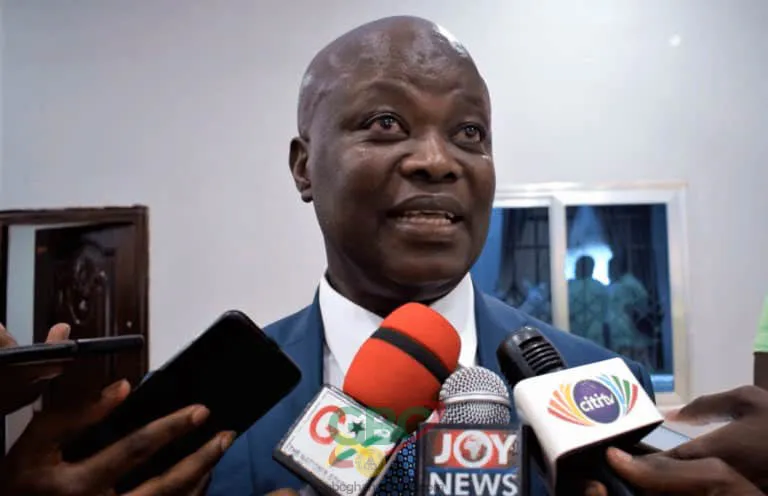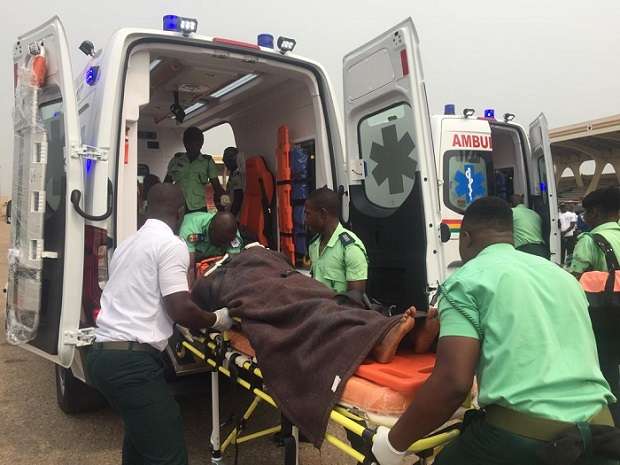Professor Ahmed Nuhu Zakaria, CEO of the National Ambulance Service, gives an in-depth analysis of the current state of pre-hospital emergency care in Ghana.
He emphasized the need for a well-coordinated and well-equipped system that ensures swift medical intervention in emergencies. Addressing concerns over the recent Nsuatreman stadium incident involving an ambulance at a stadium event, he clarified key misconceptions and highlighted the structural gaps that need urgent attention in Ghana’s Pre-hospital system.
According to Prof. Zakaria, a properly developed emergency response system is not merely about ambulances but a comprehensive network. He defined;
“A coordinated network of trained personnel, health impact personnel, medical resources, and communication infrastructure designed to provide time-efficient and high-quality medicine to patients before they reach a facility.”
Professor Ahmed Nuhu Zakaria CEO of the National Ambulance Service
To this effect, he pointed out that such a system must ensure rapid response, appropriate intervention, and seamless integration with hospital-based emergency care. These components, he noted, are crucial in reducing patient mortality and morbidity. He acknowledged;
“Since 2004, Ghana has attempted to build an emergency medical service through the National Ambulance Service, albeit with a lot of challenges. I am excited we are having discussions, and I am happy today we are able to look at it holistically. And then we can draw a roadmap and see how as a country, we would be able to develop the system.’’
Professor Ahmed Nuhu Zakaria CEO of the National Ambulance Service
Addressing the Stadium Incident: The Role of EMTs
Discussing the controversies further, Prof. Zakaria explained that the incident was misrepresented in the media. He clarified that the ambulance team was already attending to four casualties inside the stadium when the incident involving the supporter occurred outside.
He detailed that in mass casualty incidents, all EMT personnel, including the ambulance driver, are trained to assist casualties rather than remain idle. He said;
“The crew on-site consists of three members and all of them are trained emergency medical technicians (EMTs). The driver himself is also an EMT.’’
Professor Ahmed Nuhu Zakaria CEO of the National Ambulance Service
In putting this into context, he pointed out that in cases of multiple casualties, all personnel must assist in providing care by clarifying that the idea that a driver remained in the ambulance doing nothing is incorrect.

While he acknowledged that there was a delay in attending to the injured supporter, he maintained that the ambulance crew acted professionally within the available resources.
According to him, the riot ensued, and four people sustained multiple injuries. The EMTs had to move in to attend to them. The medical personnel provided care for the victim outside the stadium. whereas the EMTs later attended to him and transported him to the hospital, where he unfortunately passed away—not in the stadium as was reported.
Prof. Zakaria highlighted that one of the primary gaps in Ghana’s emergency response system is an inefficient communication and dispatch system. Prof. Zakaria stressed that a well-developed system requires a universal emergency number, a central dispatch center, and a technology-driven tracking system for ambulances.
He emphasized that a well-functioning pre-hospital emergency response system must have a single, easy-to-remember national emergency contact number. However, Ghana has attempted to establish 112, but there are still challenges that need to be addressed.
Furthermore, he highlighted the need for real-time ambulance tracking to optimize response times.
Prof. Zakaria also raised concerns about the inadequate number of ambulances in Ghana. He cited international standards, which recommend one ambulance per 50,000 people, but Ghana currently operates one ambulance per 200,000 people.
To this effect, he emphasized the need for effective traffic management to ensure ambulances reach emergencies without delays.
According to Prof. Zakaria, the quality of personnel in emergency response services directly impacts patient outcomes. He stressed that EMTs must undergo continuous training and certification to maintain high standards.
Through these measures, he believes Ghana can build a robust and responsive pre-hospital emergency system that saves lives and improves healthcare outcomes.
READ ALSO; Music Videos Outlined as Crucial in Today’s Music Industry





















